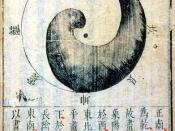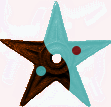According to China's Han Dynasty (207 B.C.-9 A.D.), there are two principles opposite each other in the universe: yin and yang. Yin's principles consist of femaleness, the moon, and submission, while yang's principles consist of maleness, the sun, and dominance. Yin produces yang, and yang produces yin, and neither continually dominates or determines the other. Similarly, in the short story "Life"ÃÂ, by Bessie Head, the two main characters demonstrate this universal balance. The character Life symbolizes life, while the character Lesego represents death.
Life's character represents rejuvenation and a necessity of life. For example, when she first moves into the village, "The other women briskly entered her yard with hoes to scratch out the weeds and grass, baskets of earth and buckets of water to re-smear the mud walls, and they had found two idle men to rectify the precarious tilt of the wooden poles of the mud hut"ÃÂ (p.431).
Just as the villagers give life to the yard, Life breaks the monotony of the village by presenting its people with the luxuries of expensive food. The new look of the yard is similar to the new ideas Life brings to the village, such as making a business out of prostitution. Furthermore, the villagers believe sex "ought to be available whenever possible like food and water"ÃÂ(p.431). She is a necessary part of life to both the men and the women of the village. She keeps the men healthy by making her body readily accessible to them, and she keeps the beer-brewing women happy by being their leader. Life's modern views and business skills make her important to the village Kishore 2 and to the villagers' lives.
Lesego symbolizes the death of Life's independence and livelihood. For example, upon their marriage, he "took control of all the money. She had to ask him for it and state what it was to be used for"ÃÂ(p.434). Before their marriage, Life always has her way with money: buying large amounts of food without having to consult anyone. Now, she must rely on Lesego for things that she wants. Instead of being the leader she is when she runs her prostitution business, she must succumb to Lesego. Furthermore, after the marriage, she becomes restless when the things she loves -- "hysteria and cheap rowdiness"ÃÂ (p.434) -- are taken away. By forbidding Life to have the radio on or go out with men, Lesego kills her vivacious personality. The monotony of the village which she breaks upon moving to the village comes back anew in her marriage to Lesego.
Both Life and Lesego influence the village in different ways. But Lesego's authoritarian ways overcome Life's uniqueness and vivacity. Life is an outsider in Lesego's world and is soon gone, showing that new ways of thinking or new inventions are not always ideal in a society already happy with its way of living.
Works Cited Head, Bessie. "Life."ÃÂ Literature and the Writing Process. Elizabeth McMahan, Susan X Day, and Robert Funk. 5th ed. Upper Saddle River, NJ: Prentice, 1999. 430-436.
Hooker, Richard. Chinese Philosophy: Yin and Yang. Washington State University, 06/06/99.





